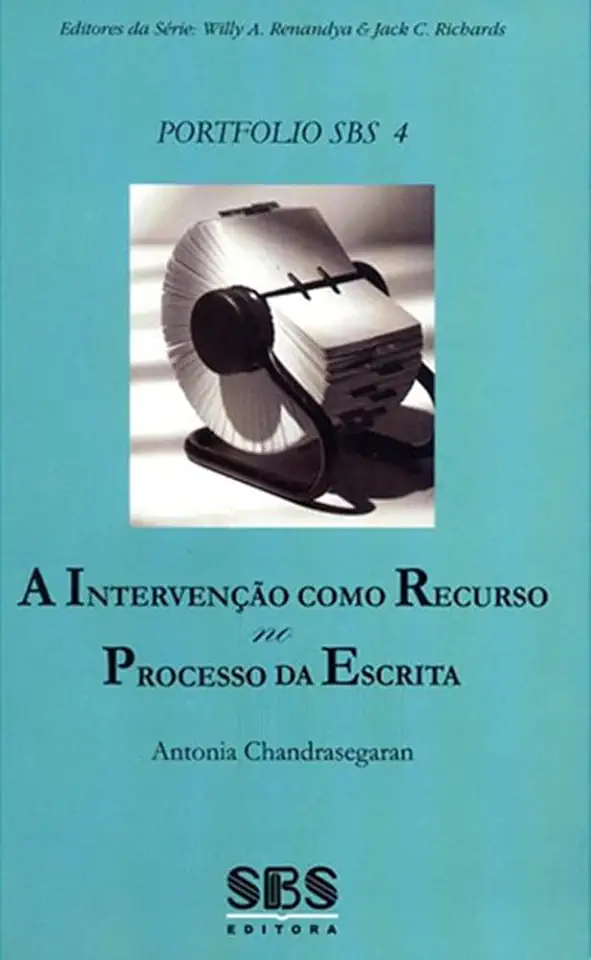
Intervention as a Resource in the Writing Process - Antonia Chandrasegaran
Intervention as a Resource in the Writing Process
By Antonia Chandrasegaran
In her book, "Intervention as a Resource in the Writing Process," Antonia Chandrasegaran argues that intervention is a valuable tool that can help writers improve their work. She defines intervention as "any action taken by a reader or writer to improve the quality of a text." This can include anything from providing feedback on a draft to helping a writer brainstorm ideas.
Chandrasegaran argues that intervention is important for several reasons. First, it can help writers identify areas where their writing needs improvement. Second, it can provide writers with the support and encouragement they need to make those improvements. Third, it can help writers develop their own critical thinking skills and become more independent writers.
The book is divided into three parts. Part One, "The Nature of Intervention," explores the different types of intervention and their benefits. Part Two, "The Practice of Intervention," provides practical advice on how to intervene effectively. Part Three, "The Impact of Intervention," discusses the positive effects that intervention can have on writers and their writing.
Key Concepts
- Intervention: Any action taken by a reader or writer to improve the quality of a text.
- Feedback: Information about a text that is intended to help the writer improve it.
- Scaffolding: Temporary support that helps writers develop their skills and independence.
- Metacognition: The ability to think about one's own thinking.
Benefits of Intervention
Intervention can benefit writers in several ways, including:
- Identifying areas for improvement: Intervention can help writers identify areas where their writing needs improvement. This can be done through feedback from readers, self-assessment, or the use of writing rubrics.
- Providing support and encouragement: Intervention can provide writers with the support and encouragement they need to make improvements to their writing. This can be done through positive feedback, praise, or simply by listening to writers talk about their work.
- Developing critical thinking skills: Intervention can help writers develop their critical thinking skills by encouraging them to think about their writing in a more analytical way. This can be done through asking questions, providing feedback, or encouraging writers to reflect on their own writing.
- Promoting independence: Intervention can help writers become more independent by teaching them how to identify and correct their own errors. This can be done through providing feedback, scaffolding, or encouraging writers to take risks.
How to Intervene Effectively
There are many different ways to intervene effectively, but some general tips include:
- Be respectful: Always be respectful of the writer and their work. This means listening to them without interrupting, valuing their opinions, and being open to their feedback.
- Be specific: When providing feedback, be specific about what you liked about the writing and what could be improved. This will help the writer to understand what they need to do to improve their work.
- Be positive: Try to focus on the positive aspects of the writing and avoid being overly critical. This will help the writer to feel encouraged and motivated to improve their work.
- Be patient: It takes time for writers to improve their work. Be patient and supportive, and don't expect them to make changes overnight.
The Impact of Intervention
Intervention can have a positive impact on writers and their writing. Studies have shown that intervention can:
- Improve the quality of writing: Intervention can help writers to produce higher-quality writing that is more clear, concise, and engaging.
- Increase student motivation: Intervention can help students to become more motivated to write and to take pride in their work.
- Promote lifelong learning: Intervention can help writers to develop the skills and knowledge they need to become lifelong learners.
Conclusion
Intervention is a valuable tool that can help writers improve their work. By providing feedback, support, and encouragement, intervention can help writers to identify areas for improvement, develop their critical thinking skills, and become more independent. If you are a writer, I encourage you to seek out intervention from teachers, peers, or other writing professionals. It can make a big difference in the quality of your writing.